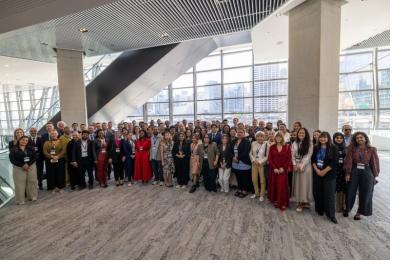Sydney, Australia – September 2025 — The United Nations Office for Outer Space Affairs (UNOOSA), through UN-SPIDER, played a key role at the 32nd United Nations/International Astronautical Federation (UN/IAF) Workshop. Held under the theme “Resilient Coasts, Resilient Earth: Innovative Space Solutions for Coastal Resilience and Emergency Management,” the event was co-organized with the International Astronautical Federation (IAF) and supported by the Maldives Space Research Organisation (MSRO). Focusing on the intersection of space, oceans, and Small Island Developing States (SIDS), the workshop brought together experts to advance space-based solutions for disaster risk reduction and coastal resilience.
In her opening address, UNOOSA Director Aarti Holla-Maini emphasized three priorities for global action, namely inclusivity, innovation, and integration, which guided discussions throughout the workshop. These principles shaped UN-SPIDER’s sessions on accessibility, community-centered design, and cross-sector collaboration. They were reflected through partnerships uniting space agencies, civil protection authorities, marine scientists, and private innovators.

Together with MSRO, UNOOSA and UN-SPIDER opened the event, emphasizing the role of space applications for resilience and emergency management and the leadership of SIDS and coastal nations. Through technical and policy sessions, UN-SPIDER showed how space-based data bridge global technology and local decision-making for disaster preparedness and response. In “Risk, Response, Residue: The Disaster Lifecycle from Orbit” academic pitch session, young researchers presented innovative uses of satellite data across the disaster cycle.
UN-SPIDER moderated the “A Spectrum of Resilience: The Role of Communities in Space-Based Disaster Risk Management” session, emphasizing that space-based solutions must be designed with, not just for, the people they serve. The session showed how community engagement translates satellite data into actionable knowledge, aligning with UN-SPIDER’s Technical Advisory Missions that ground-truth geospatial data and build local capacity.

In “Digital Oceans, Resilient Cities: EO, GeoAI, and Digital Twins in Action,” UN-SPIDER contributed insights into how EO, GeoAI, and digital twins model coastal dynamics, forecast risks, and guide resilient infrastructure planning at the ocean-urban interface. UN-SPIDER also chaired the “Better Data for Timely Action: The Building Blocks of Satellite-Enabled Early Warning” session, which explored how space-based datasets support early warning and decision-making, and how space agencies and private partners deliver timely satellite-derived insights for response.
Finally, UN-SPIDER moderated the “Fireside Chat: From Surviving to Thriving,” which brought together national disaster management organizations (NDMOs) from coastal nations to discuss cross-border coordination and capacity-building for climate resilience.
In closing, Director Holla-Maini reaffirmed UNOOSA’s commitment to translating global dialogue into local action. Building on the workshop’s outcomes, UNOOSA and UN-SPIDER emphasized collaboration, turning data into action, and investment in space-based innovation for resilience. UNOOSA remains ready to support these goals through UN-SPIDER and the emerging SPACE4OCEAN Alliance to advance cooperation and sustainable ocean governance.

